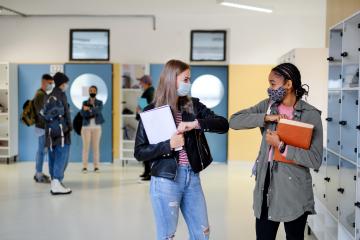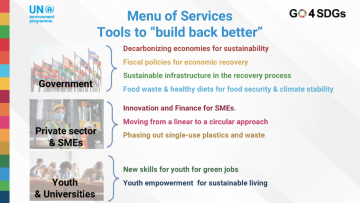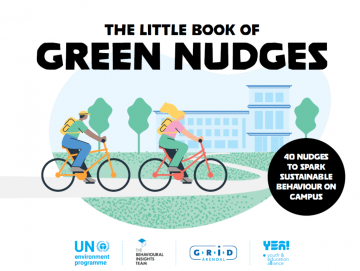
The Global Opportunities for SDGs (GO4SDGs) initiative was launched by the United Nations Environment Programme (UNEP) and the German government to accelerate the shift to inclusive green economies and sustainable production and consumption patterns. The initiative facilitates dialogue and exchange among practitioners on best practices for replicating and upscaling across regions.
#GO4SDGs partners have been active in 2020 and together have developed a menu of services that presents a range of available tools and services to support governments, businesses and youth accelerate the transition to inclusive green economies and sustainable living.
Read on for an overview of the initiative’s activities in 2020, and what to look forward to in 2021. Stay tuned!
#GO4SDGs launches menu of services to build back better
 In July 2020, #GO4SDGs launched the first iteration of the initiative’s menu of services. The menu provides a snapshot of existing tools, services and digital platforms that partners can offer to support governments, businesses, especially small and medium-size enterprises (SMEs), and youth and universities as they transition to a green economy.
In July 2020, #GO4SDGs launched the first iteration of the initiative’s menu of services. The menu provides a snapshot of existing tools, services and digital platforms that partners can offer to support governments, businesses, especially small and medium-size enterprises (SMEs), and youth and universities as they transition to a green economy.
The menu was formally presented by Adriana Zacarias Farah, UNEP’s Head and Global Coordinator of the #GO4SDGs initiative, at a virtual side event at the annual High-level Political Forum on Sustainable Development (HLPF).
The menu of services is now available online in English, French and Spanish.
More at: ggkp.org/news/go4sdgs-initiative-offers-menu-services-build-back-better-and-green
HLPF side event: Global opportunities to jumpstart the real economy #GO4SDGs
 The Recovering better: Global opportunities for jumpstarting the real economy side event at the HLPF brought together #GO4SDGs partners, including the World Economic Forum, German Ministry of Environment and International Trade Union Confederation (ITUC) to explore opportunities to jumpstart economies and rebuild societies.
The Recovering better: Global opportunities for jumpstarting the real economy side event at the HLPF brought together #GO4SDGs partners, including the World Economic Forum, German Ministry of Environment and International Trade Union Confederation (ITUC) to explore opportunities to jumpstart economies and rebuild societies.
Leaders at the event agreed that the only way countries will recover from COVID-19 in a way that ensures prosperity for all and builds resilience is if the international community remains committed to the Sustainable Development Goals (SDGs) and Paris climate change agreement.
“We have to make sure that the capital for recovery measures is invested wisely, respecting environmental boundaries, and does not hamper economic growth,” said Stephan Contius, Germany’s Commissioner for the 2030 Agenda, at the Federal Ministry for the Environment, Nature Conservation and Nuclear Safety.
“The 2030 Agenda and Paris Agreement are our roadmaps for building back better,” said Joyce Msuya, UNEP Deputy Executive Director. “They set the social floors and upper boundaries of the planet’s life support functions. But we must keep our focus on real economy actors, including SMEs.”
The event was jointly organized by UNEP and SEED and was hosted by the Green Growth Knowledge Platform (GGKP).
Establishing regional peer-to-peer working groups for more sustainable food systems
Lack of data is a major cause for inaction on food waste. #GO4SDGs will address the lack of food waste data in the Global South by building capacity for application of UNEP’s Food Waste Index methodology, including data collection and cross-country data comparison, and facilitating regional collaboration on food waste measurement, strategy development and action.
Under the #GO4SDGs initiative, working groups on food waste measurement are being set up in five regions to support countries in measuring their baselines – an essential element in developing national food waste strategies and making progress on halving food waste by 2030.
More at: ggkp.org/news/no-time-waste-using-data-drive-down-food-waste
The Little Book of Green Nudges goes regional
 The Little Book of Green Nudges is a practical guide to encourage students and staff on college campuses to adopt more sustainable practices – from what they eat to what they consume. The book provides 40 simple “nudges” to help spark sustainable behaviour, such as eliminating trays in cafeterias to reduce food waste and providing more spaces for parking bicycles and fewer for parking cars.
The Little Book of Green Nudges is a practical guide to encourage students and staff on college campuses to adopt more sustainable practices – from what they eat to what they consume. The book provides 40 simple “nudges” to help spark sustainable behaviour, such as eliminating trays in cafeterias to reduce food waste and providing more spaces for parking bicycles and fewer for parking cars.
#GO4SDGs will bring the Little Book of Green Nudges to life by working with universities and academic institutions to apply the solutions in the book across five regions in collaboration with partners, including the Alianza de Redes Iberoamericanas de Universidades por la Sustentabilidad y el Ambiente (ARIUSA) and the US Partnership for Education for Sustainable Development and Africa Green University Network (AGUN).
“Many of the solutions are easy, simple and even fun to do,” said Adriana Zacarias Farah, #GO4SDGs Head and Global Coordinator. “By sharing these solutions, others can replicate and/or scale these inspiring approaches to going green.”
The Little Book of Green Nudges was recently published by UNEP with support from The Behavioural Insights Team and GRID-Arendal.
More at: ggkp.org/news/go4sdgs-bringing-little-book-green-nudges-five-regions
Anatomy of Action
If enough people make changes in a few key areas – food, stuff, money, mobility and recreation – the global momentum of collective action will change the world. The Anatomy of Action, a partnership project between UNEP and The UnSchool of Disruptive Design, outlines the top-level changes in these areas that any individual can make to support the growing shift to global sustainability.
With the support of #GO4SDGs, the Anatomy of Action’s 2020 campaign for Latin America went viral, with over 68,000 impressions and reaching one million people. Over 85% of participants were female and 66% were aged 34 or younger.
During the challenge, 15,448 viewers joined seven live events starring regional influencers. The events included activities centered on plant-based meals and sustainable diets (featuring @macca_bites), conversations about defying traditions to rethink consumption habits for the holidays (featuring @vayaconsumismo) and tips to reduce the impact of online shopping and digital actions (featuring @sustentofila).
“We are all citizen designers, with the power to effect positive change through our everyday actions, no matter who we are, or where we live,” said Garrette Clarke, a Sustainable Lifestyles Programme Officer at UNEP.
More at: ggkp.org/tools-and-platforms/anatomy-action
GO4SDGs regional roadmaps
In collaboration with partners, #GO4SDGs developed five regional roadmaps for implementation, responding to regional priorities and building cooperation with strategic partners for a higher impact. The flagship activities have been defined as: mainstreaming sustainable consumption and production in climate action, advancing SMEs financing for circularity and innovation and empowering youth for sustainable lifestyles.
#GO4SDGs was launched in West Asia at the event Resource Efficiency in the Arab Region: Monitoring Progress of SDG 12 and Building Back Better from COVID-19, organized by the United Nations Economic and Social Commission for Western Asia (ESCWA), UNEP and the League of Arab States in October 2020.
Looking towards 2021
The #GO4SDGs initiative aims to drive action and create meaningful change by supporting governments, SMEs and youth to integrate sustainable consumption and production and inclusive green economy approaches into their policies, practices and everyday decisions in order to achieve the SDGs and Paris climate change agreement.
Working with and through existing UNEP regional offices and hubs, #GO4SDGS has established partnerships for a series of peer-to-peer exchanges and learning events in 2021, to foster enhanced delivery and coordination for SDG 12 across the globe. Planned events include: a high-level dialogue on resource efficiency benefits for climate and SDGs; the launch of regional roadmaps in Latin America and the Caribbean, Europe, Asia-Pacific and Africa; regional capacity building on measuring food waste index (SDG 12.3); and workshops focusing on the Sustainable Consumption and Production Hotspots Analysis Tool (SCP-HAT) in all five regions.
#GO4SDGs will also work towards accelerating the uptake of resource efficiency in SMEs, including through the deployment of the forthcoming I-GO self-assessment tool for SMEs, advancing financing for circularity, and empowering youth to adopt more sustainable lifestyles through green campuses and sustainable living leadership academies.
#GO4SDGs is also developing a learning module for SDG 12, with region-specific campaigns on key priorities, including plastics, food, fashion and waste, with the support of strategic networks and partners.
#GO4SDGS would like to thank the incredible support of the German Ministry for the Environment and the project partners.

